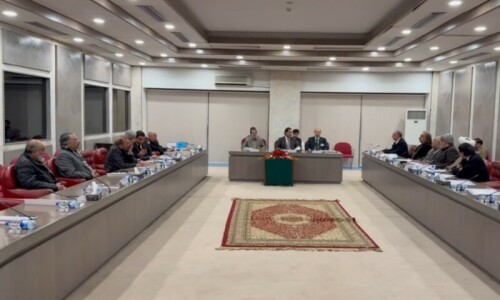LAHORE: The government could collect Rs44 billion additional tax revenue annually by regulating rapidly growing illicit tobacco trade in the country through strict enforcement of the law, claims Roman Yazbeck, the managing director of multi-national tobacco firm Philip Morris Pakistan.
The share of the informal, non-tax-paid cigarette trade in Pakistan, one of Asia’s largest markets where 80-85bn sticks (packing comprising 10 packets) are sold annually, has risen from 34.7 percent to 50pc in the last two years, according to an industry estimate based on a retail audit.
Normally, the ratio of the share of legal cigarette industry to the illegal trade is 90-10 in most countries. As opposed to the other markets, the smuggled brands form a fraction of the illegitimate trade in Pakistan where the informal industry is flooding the shops with cheaper brands.
The industry blames growing price gap between legitimate industry brands and illicit non-tax-paid ones for the rapidly increasing illicit cigarette trade.
The government has twice raised excise duty on cigarettes by 46pc and 32pc in September and June 2019, expanding the price differential from 53pc to over 100pc in certain cases.
“It is natural for a government to raise its revenues through taxes from the tobacco sector to discourage smoking (because of public health issues). We are happy to pay taxes and get regulated. But it cannot take place if half of the market engages in illicit trade and does not pay taxes,” Yazbeck told this reporter during a video call from the United States.
“We respect the government’s decision to increase taxes on cigarettes but it should also consider moderating price elasticity to ensure viability of the tax-compliant industry.”
He said the industry wasn’t asking for a cut in taxes, but wanted the authorities to regulate the illicit trade through strict enforcement of the law to curb illegal trade.
“The data shows that the increased taxes have not helped reduce tobacco consumption as smokers have switched to illicit, cheaper brands that are available at half the price of the cheapest tax-paid brand available in the market. The illegal tobacco trade is thriving at the expense of government revenues and sustainability of the compliant firms.”
The Pakistan Tobacco Company and Philip Morris, both multinationals, control 98pc of the legitimate tobacco market in the country.
Yazbeck said the industry was willing to sit with the authorities to share their experience in curbing illicit trade elsewhere.
“We are asking for a level playing field, an environment to restore viability of the regulated business and increase tax revenue for government. It’s a low-hanging fruit for government with significant returns for it.”
Published in Dawn, May 27th, 2020













































Dear visitor, the comments section is undergoing an overhaul and will return soon.